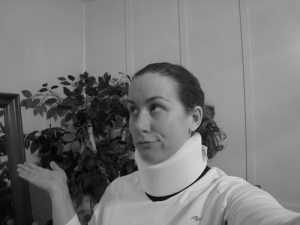What is Chiropractic Treatment of Whiplash?
To download a copy of this week’s newsletter, please click here.
Clear Lake City Chiropractor Comments: Whiplash is basically an injury to the muscles, the muscle attachments (tendons), ligaments, and sometimes the nerves that exit the cervical spine. The degree of injury is highly variable and depends on many factors, some of which include gender/body size (slender woman are especially at risk), awareness of the impending collision, head position at time of impact, the angle of the seat back (bent back is worse that upright), the position of the headrest (too low is common), the amount of vehicle damage (less damage can be worse due to energy transferred to the contents/occupants), the speed of the collision, and many others.

Therefore, when discussing the treatment approaches used by chiropractors, it is not appropriate to generalize since each case is so unique. With that said, when a whiplash patient visits a chiropractor, the first step is obtaining as much information as possible. A thorough history and examination are important in determining the treatment plan and help to determine severity of the injury. Chiropractors often offer different types of treatment that may include: manipulation, physical therapy modalities such as muscle stimulation, relaxation, ultrasound, low level laser therapy, cervical traction, and others. Spinal manipulation (often referred to as an adjustment) addresses joint dysfunction and can be performed with one of several approaches. The first and quite common approach uses a high velocity, low amplitude (quick) approach where joint cavitation (the “crack”) often occurs. Another approach is a low velocity, low amplitude technique where mobilization is used, which is more of a stretch to the end-range of intersegmental (between the vertebrae) motion and rarely, is there joint noise/cavitation.
Muscle relaxation or stimulation is performed for muscle dysfunction, which may include relaxation or stimulation techniques. Gentle stretches to a muscle that has excessive tightness or, repeated contractions of a weak (“inhibited”) muscle is also commonly utilized and very helpful when muscle dysfunction is present.
Exercises are frequently prescribed by chiropractors. These are taught in a supervised manner and when it is safely performed and understood, they can be performed at home, work, outside the office setting. It may require a few sessions to ensure accuracy of the exercise performance. Because of muscle spasm, joint dysfunction, and pain, patients often develop faulty postures or compromised movements that become “bad habits.” To break these “bad habit” positions/postures, stabilization and sensory-motor retraining exercises can be very helpful. These exercises retrain the nervous system to achieve better coordination and control movements and to maintain stability of the weakened neck muscles.
Advice on bend/lift/pull/push and/or work related activity is extremely important in order to avoid repeat exacerbations or “flare-ups” if not properly dwelt within the clinic. Advice on recreational and home related activities is also very important for the same reasons.
The chiropractic whiplash treatment plan is unique for every individual person given the significant number of variable initially discussed. One or more of the approaches discussed may be utilized. If needed, chiropractors often partner with other doctors if there are medication or surgical requirements. If you, a loved one, or a friend is struggling with whiplash residuals from a motor vehicle collision, you can depend on receiving a multi-dimensional chiropractic assessment and therapeutic approach at this office. We sincerely appreciate your confidence in choosing our office for your health care needs!
Dr. Ward Beecher practices at Beecher Chiropractic Clinic at 1001 Pineloch, Ste 700 Houston, TX 77062. You can schedule an appointment with the best chiroprator in Houston or by calling (281) 286-1300. If you have any questions regarding this blog, please comment below!

